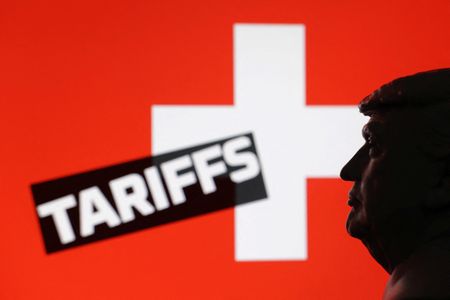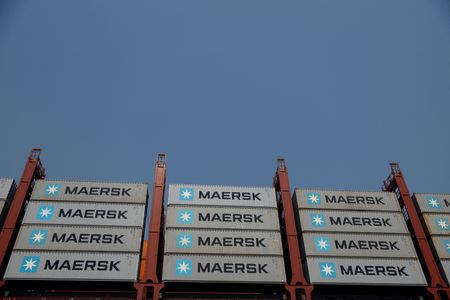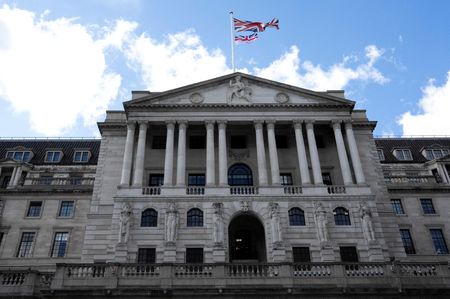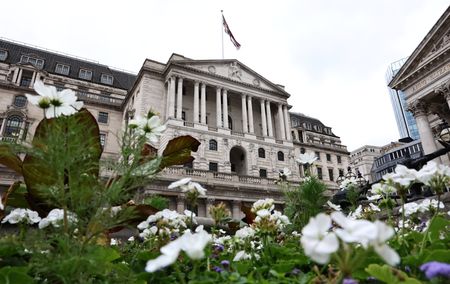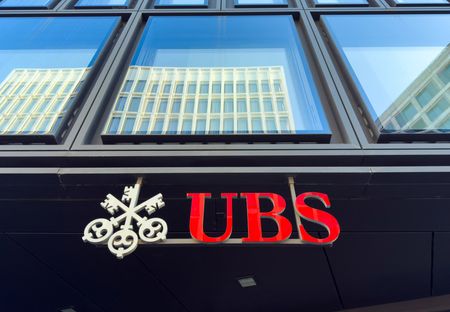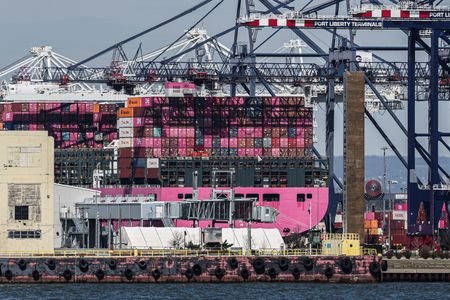By John Revill
ZURICH (Reuters) -Switzerland’s government was due to hold an emergency meeting on Thursday after U.S. President Donald Trump implemented a crippling import tariff on Swiss goods that threatens to inflict serious damage on its export-focused economy.
The 39% import levy – among the highest applied to any country’s exports under Trump’s global trade reset – took effect at midnight Washington time (0400 GMT) after an 11th-hour effort by Swiss officials failed to produce a better deal.
An urgent meeting of the seven-member Federal Council – Switzerland’s governing cabinet – would take place in Bern in the early afternoon, the government said a post on X.
Swiss President Karin Keller-Sutter left Washington on Wednesday without a deal following a hastily organised trip.
While she said she had a “very good meeting” with U.S. Secretary of State Marco Rubio, Keller-Sutter did not sit down with Trump or any of his leading trade officials, two sources told Reuters.
Her proposal for a 10% tariff rate was rejected by U.S. officials, one of the sources added.
Like Switzerland, dozens of countries that have failed to strike deals with Washington are facing new tariff rates, which U.S. importers will begin paying from Thursday, replacing a temporary 10% levy in place since April.
“Billions of dollars, largely from countries that have taken advantage of the United States for many years, laughing all the way, will start flowing into USA,” Trump wrote on his social media platform Truth Social.
Trade talks between Switzerland and the U.S. will continue, a separate Swiss source familiar with the discussions told Reuters, but more time was needed to strike a deal.
The person, who spoke on condition of anonymity due to the sensitivity of the matter, believed a deal would ultimately materialise but would not speculate when this might happen.
‘INSANELY HIGH’ TARIFFS ON SWISS GOODS
Switzerland was stunned by Trump’s decision last week to apply the steep rate, which is much higher than those negotiated by the European Union and countries including Britain, Japan and South Korea.
Thursday’s front page of the daily tabloid Blick was all black with the banner headline “39%”.
“This number is insanely high,” said Manfred Elsif, director of research at the University of Bern’s World Trade Institute. “Trump is simply obsessed with trade deficits in goods and does not understand that his short-sighted actions sour relations with allies.”
Switzerland removed tariffs on nearly all imports in 2024, extending virtually free access to its markets for U.S. products.
But Keller-Sutter said last week that Trump was focused on its trade surplus with the United States, which amounted to 38.5 billion Swiss francs ($48 billion) last year largely due to pharmaceutical exports, as well as gold, machinery and watches.
Switzerland’s surplus was up by 17% in the first six months of this year, Swiss customs data showed, as companies such as watchmaker Swatch Group rushed to avoid the tariffs by front-loading shipments.
Industry associations and economists have said the tariffs will inflict major damage on the economy, put jobs at risk and curtail economic growth.
Hans Gersbach, an economist at KOF Swiss Economic Institute at ETH, a Zurich university, estimated that the levies, if they remained in place for an extended period, would result in a GDP loss of 0.3% to 0.6% between August 2025 and August 2026.
“We will not enter a recession, but we are moving towards stagnation,” he said.
The U.S. is a leading market for Swiss watches, specialised machinery, pharmaceuticals, chocolate and cheese.
“If this horrendous tariff burden remains in place, it will mean the de facto death of the export business of the Swiss tech industry to the USA,” industry association Swissmem said on Thursday.
Switzerland’s private sector urged the government to continue talks aimed at reducing the tariffs.
“They severely burden the international competitiveness of our companies in the U.S. market, jeopardise long-standing trade relationships and seriously endanger thousands of jobs,” said Jan Atteslander, of business group economiesuisse.
Swiss blue chip stocks were up 0.44% in early trading on Thursday, holding above Monday’s near-four-month lows, and trading roughly in line with the rest of the European equity market. The Swiss franc strengthened against the dollar, which fell 0.2% to 0.80475 francs.
“Markets are very good at pricing in tariff impacts it seems, and the lack of any drama so far on Swiss markets suggests a hope of some form of deal in the coming weeks,” said IG broker Chris Beauchamp. ($1 = 0.8047 Swiss francs)
(Additional reporting by Dave Graham, Olivia Le Poidevin and Amanda Cooper; Writing by Joe Bavier; Editing by Alex Richardson)

